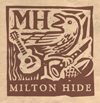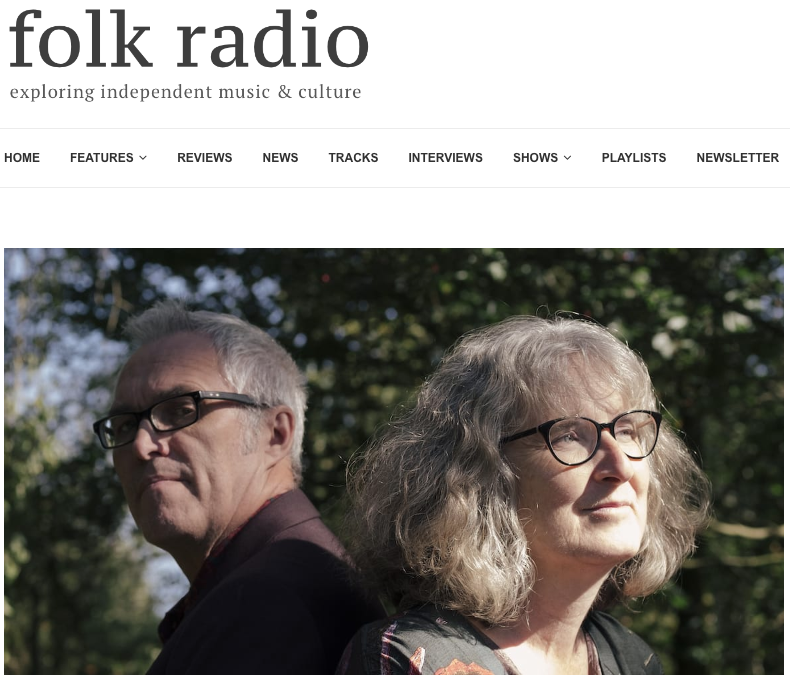“An album that most definitely has its fingers dipped in the sparkle jar”.
Milton Hide – The Holloway
Milton Hide‘s ‘The Holloway‘ is named after a tree-tunnelled path in East Sussex where Josie and Jim Tipler walk their dog (the term derives from the Old English “hola weg,” meaning sunken road), while the duo’s name is taken from a local village. They bring trad folk and Americana influences to bear on this their second album, the songs variously informed by personal, political and literary references.
Featuring a clarinet riff, they open with the jaunty All Gone South, its three verses respectively referencing a friend who wintered in Spain, the English ‘north/south divide’ with manufacturing having taken a back seat to financial services and the third the hypocrisy of Brexit supporters who retain property in Europe.
Sung by Jim, again featuring clarinet, and joined by a 12-string, their local connection surfaces on the sway along Cuckmere, a celebration of the Cuckmere Valley where “Swallows and housemartins sail overhead/As the bees in the cowslips do lie/Butterflies dance over the downs sleeping form/Searching for nectar in the wild orchid bloom”. Interestingly, in a previous life, it was a country death row song, the chorus remaining the same. Also revisited, the second part of Found Drowned / A Perfect Place was originally featured on their 2018 debut EP. The guitar and clarinet instrumental is preceded by an acapella duet inspired by a painting by Frederick Watts and a Victorian term used on death certificates for those who had committed suicide and here employed as a metaphor for the feelings many felt after the Brexit vote (“Will it be said we were found drowned/On a wave of lies a voice said leave”).
Things take a literary turn with The Ballad Of Gabriel Oak which, as you will surely know, is named for the shepherd hero of Thomas Hardy’s Far From The Madding Crowd and, sparsely accompanied by mandolin and clopping percussion and sung by Josie condenses the 464-page novel about his trials and tribulations in pursuit of the wilful Bathsheba into nine verses and the chorus of “When I look up it’s you I’ll see/When you look up it’s there I’ll be” from the book.
Touching on American notes with its single guitar instrumental riff based on a traditional Cajun tune, A Little Bit Alike is a playful gentle call-and-response duet about how the differences between us make life good (“Ying and yang ain’t got nothing on us/we’re more like a chalk and cheese/We go together like a bat and a ball/But we ain’t no pod full of peas”). Then, by way of a darker turn, sung by Josie and accompanied by fingerpicked guitar, double bass, clarinet and cajon, Widow’s Revenge, a sequel to Monkyn Pyn from the EP, tells of a woman wrongly accused of being a witch who returns to wreak revenge (“When darkness falls, you close your eyes, I’ll creep inside your dreams/Alone you’ll suffer nightmares, And none shall hear your screams”) on the aforementioned Pyn and those who consigned her to the fire, building to a frenzied pagan dance.
Her story told in the 2020 film Ammonite starring Kate Winslet and Saoirse Ronan, Anning’s Fossil Depot, arranged for strings by Simon Yapp and danced on acoustic guitar, celebrates the18th century Lyme Regis palaeontologist Mary Anning credited with the first discovery of ichthyosaur fossils but only recently given proper acknowledgement for her work, the riff subtly nodding to the Fossils of Camille in Saint Seans’ Carnival Of The Animals.
Returning to literary sources, Sparkle Jar was inspired by Chris Packham’s Fingers In The Sparkle Jar, the story of a boy absorbed in the world of nature and trying to find his place in the world, played out to warm clarinet and dreamy 12-string.
More here: https://www.miltonhide.com/
Their voices interwoven, Unsaid strikes a poignantly personal note, the emotion palpably quivering in their voices, written after the passing of a close friend, leaving behind a young daughter, the song imagining what her father might have said to her in farewell (“And if you ever let the sun go down before you say goodbye/Have no regrets/Now I can’t be by your side/But I know you’ll be just fine”), the message being to never leave things unsaid.
The final song, bringing the electric guitar into the arena with bodhran accompaniment to its upbeat but gentle country rock and sung by Jim, The Happiest Man On Earth is titled after the book of the same name by Auschwitz survivor (“172338, burned into my skin”) and inspirational speaker Eddi Jaku who, while declaring “I won’t forgive, and I can’t forget” refused to be consumed by hate “as that just deepens the scars” and, instead, vowed to be the happiest man on earth as a mark of respect for all of those lost in the holocaust.
It ends with the title track, an instrumental for slow clarinet and guitar written specifically for the album designed to capture the serenity of walking the ancient path through the intertwined trees, a tranquil sunset for an album that most definitely has its fingers dipped in the sparkle jar

